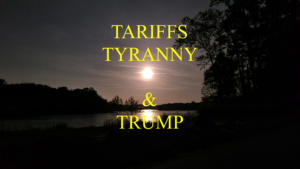
[ANALYSIS and OPINION]
We apologize if this page seems to go in several directions at once. This page was originally posted in April 13, 2025, just as President Trump has implemented a revolutionary system of astronomically high tariffs applicable to U.S. imports. Originally it dealt with tariffs, the need to raise wages to overcome inflation (and how to do it in a noninflationary fashion) and the solvency of the social security system. Interestingly, rectifying issues associated with the solvency of social security will likely have a big effect on future immigration policy. America is not having enough babies to keep Social Security solvent into the next decade and beyond. In other words a rational immigration policy will be needed. That and the fact that birth rates of the different races various will greatly affect the demographics of America make it almost impossible to conceive of an America as Trump and MAGA envision it. The numbers just don’t point in that direction. In any event, we’ve done several videos talking about tariffs. Here’s what the Gipper himself said about tariffs back in 1987
(Just remember this. When President Biden left office again in January 2025 the unemployment rate was 4.1% and the federal funds rate was 2.9%.)
Here are two of our lectures on international trade, that we did back in 2017. These videos should still be very enlightening for anyone who wants to truly understand the dynamics behind international trade. This is because, in a world without Trump, what was said in 2017 would be true in 2025. (In other words, the “science” of international trade, if it can be called that, is still true.) However, with the most recent re-election of Donald Trump in 2024, tariffs have entered the picture in a big way and so, trade is now far less free than what Adam Smith, David Ricardo (the two founders of capitalistic free trade theory) or most sane present-day economists would have ever recommended. Moreover, because of Trump’s increasing willingness to erect trade barriers (such as tariffs) organizations like the World Trade Organization (organized in 1994), which were designed to make international competition for trade fairer and “rules based”, will have far less impact than had autocrats like Xi, Putin and Trump not ascended to power. This is because, autocrats know only two things— power and the use of it to bully others to get their way. In short, autocrats are far less inclined to worry about rules even if they and all other nations had previously agreed to them. Never mind that years of trust building amongst nations are destroyed in the process.
Here’s a short and sweet video that provides an example of David Ricardo’s theory of comparative advantage which demonstrates that all nations participating in free trade are economically better off because of it. (Ricardo’s theory is a refinement of Adam Smith’s free trade theories which he first published in the Wealth of Nations back in 1776).
Next is an in depth crash course for “wannabe” MBAs studying international trade and business. Again this is from 2017, but would, but for Trump, still be largely true.
(If one wants to see an analysis of incomes, income gaps, employment, unemployment you may want to skip until the 1:12.16 mark of the next video.)
https://youtu.be/bMhgsotZQw8?si=C3StopocCpPVslrl
Tariffs are almost always inflationary, because inevitably some or all of the cost of the tariffs ultimately get passed on to consumers. Moreover, they often start trade wars with other countries imposing their own tariffs, making U.S. exports to those countries more expensive to overseas consumers, which in turn of cause U.S. exports to other countries to decrease, which hurts domestic producers. Moreover, tariffs increase international tensions which often lead to international conflict.
On the other hand, a big problem with free trade however is the a small portion of the population often finds itself losing their jobs because of foreign competition (which comes in many forms). This is clearly a cost of a free trade policy. The nation as a whole benefits from free trade, but some (albeit a smaller portion of the general population) lose out. In our opinion this problem should be addressed by means other than enacting tariffs and/or the erection of trade barriers. Federal funds for worker retraining, relocation assistance, supplemental unemployment benefits and/or universal basic income are avenues worth exploring. A major reason for preferring a free trade approach is that free trade forces all U.S. companies to remain lean, mean and competitive on the world economic stage. It also forces them to innovate and remain up to date in technology.
Here’s the updated video originally associated with this blog post:
[The original video titled titled Tariffs Tyranny & Trump , has since been relegated to the trash bin for lack of views]
Here’s the new video (retitled) Better Pay Inflation Immigration & Retirement posted April 14, 2025
And for those whose thirst for knowledge is unquenchable, please see our other economic lectures on fiscal policy, interest rates and monetary policy, currency exchange rates and more at: